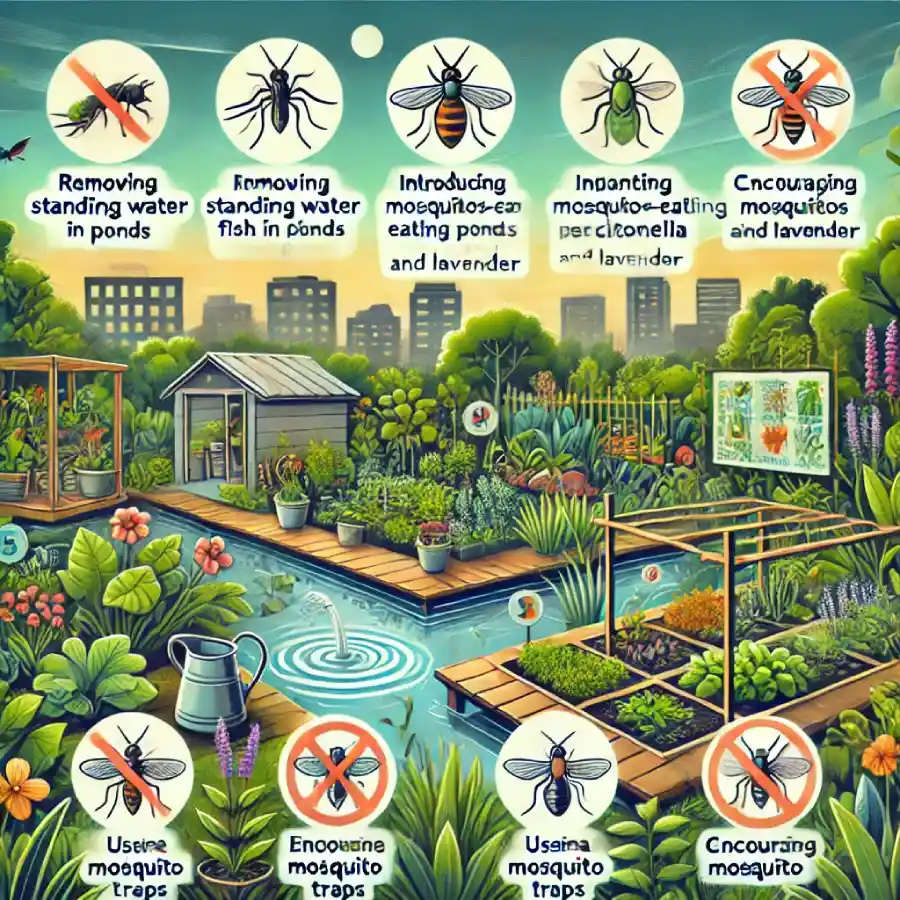Effective Strategies for Managing Mosquito Populations in Urban Gardens
Introduction to Managing Mosquito
The rise of urban gardening has brought a refreshing patch of greenery into cities predominantly made of concrete and steel. However, with the joys of nurturing a garden come the uninvited guests, mosquitoes. These tiny, winged intruders are not merely nuisances; they can seriously affect the city dweller’s quality of life. Urban environments offer the ideal breeding conditions for mosquitoes. To enjoy your garden to the fullest, it’s crucial to implement effective management strategies. Among these, the benefits of using mosquito barrier sprays are clear. These sprays create a protective shield around your garden, targeting mosquitoes at their larvae and adult stages, significantly reducing the local population. The benefits to using mosquito barrier sprays include long-lasting protection, allowing you to enjoy your garden more without the irritation of bites. These sprays are made with eco-friendly ingredients, such as citronella and essential oils, which are safe for beneficial insects and the environment. Plus, they’re easy to apply and cost-effective, making them a practical solution for keeping your urban garden mosquito-free while maintaining its natural beauty.
Understanding Urban Ecosystems
Urban ecosystems are complex and uniquely conducive to mosquito proliferation. While natural settings often have predators to keep mosquito populations in check, urban areas typically lack these natural balance-keepers. Instead, cities provide numerous breeding sites thanks to forgotten puddles, discarded containers, and neglected gutters. The warm temperatures retained by concrete structures and abundant water sources make urban areas hard to compete with in terms of comfort for mosquitoes. Understanding these ecological conditions is vital for formulating effective management plans. It requires city planners, communities, and individuals to act concerted to alter the environment to make it less favorable for mosquitoes.
Habitat Control Techniques
Eliminating breeding grounds is the first line of defense in controlling mosquito populations. Mosquitoes need stagnant water to deposit their eggs. Residential gardeners can significantly decrease mosquito populations by frequently checking and removing these water sources. Simple actions like emptying water from flower pot trays, fixing leaky outdoor faucets, and pitching up children’s toys can make a world of difference. Furthermore, maintaining gardens by trimming overgrown bushes and mowing lawns reduces shaded areas where mosquitoes prefer to rest during the day’s heat. Through these efforts, gardeners not only keep mosquito populations under control but also enhance the aesthetics and health of their gardens.
Practical Steps for Habitat Control
- Inspect your yard weekly for sources of standing water, such as buckets and old tires.
- Ensure that decorative ponds or fountains have a running system or fish that eat mosquito larvae.
- Seal rainwater collection barrels and window wells with mosquito-proof mesh coverings.
Biological and Natural Methods
Incorporating biological controls into mosquito management offers an eco-friendly alternative to chemical treatments. Encouraging natural predators such as bats, birds, and dragonflies can significantly reduce mosquito numbers. Planting repelling plants like marigolds, also known for repelling mosquitoes, can be effective. Essential oils derived from plants like citronella and eucalyptus provide additional mosquito deterrents.
The Role of Technology in Mosquito Control
Technology has been pivotal in revolutionizing mosquito control methods in recent years. From ultrasonic repellers to smartphone apps that alert users of high-density mosquito zones, technology provides innovative solutions to age-old problems. Automated mosquito traps that simulate human breath and larvicide-infused dispensers exemplify how tech-savvy solutions can seamlessly blend with traditional methods. According to the CDC, these technological innovations are crucial for both monitoring and reducing mosquito populations sustainably. These advanced tools offer immediate relief and contribute to long-term control strategies by gathering data and enhancing predictive models for mosquito activity.
Public Health Implications
The management of mosquito populations holds immense significance for public health. Mosquitoes are vectors for numerous diseases like Malaria, Dengue, Zika, and West Nile Virus. Even in urban settings that seem disconnected from nature, mosquitoes pose a considerable health risk, particularly to children and older people. Effectively controlling these pests can significantly reduce the incidence of these diseases, improving overall public health and reducing healthcare costs. Public health experts advocate for comprehensive municipal mosquito control programs, education on preventative measures, and community involvement to tackle these challenges proactively.
Common Misconceptions About Mosquito Control
Many myths deter effective mosquito management. One common misconception is the belief that over-the-counter bug zappers are highly effective against mosquitoes. However, data shows they mostly kill beneficial insects and do little to reduce mosquito populations. Another common belief is that all species are attracted to light, yet not all mosquitoes behave this way; their attraction is often to human scent and carbon dioxide. By addressing these misconceptions with factual insights, communities can adopt more effective and resourceful approaches to control strategies, leading to enhanced outcomes and better use of resources.
Conclusion and Future Outlook
Successful mosquito management involves a multipronged approach that combines habitat control, technology, natural methods, and public health efforts. Continuous education and collaboration among communities, researchers, and policymakers will be crucial as new challenges arise alongside changing climates and urban expansion. The battle against mosquitoes is ongoing, but with diligent effort and innovative solutions, urban gardeners can create green spaces free from the nuisance and health risks posed by mosquitoes. Future advancements promise even more creative strategies to manage these persistent pests, ensuring that our urban sanctuaries remain welcoming and safe for all who enjoy them.

